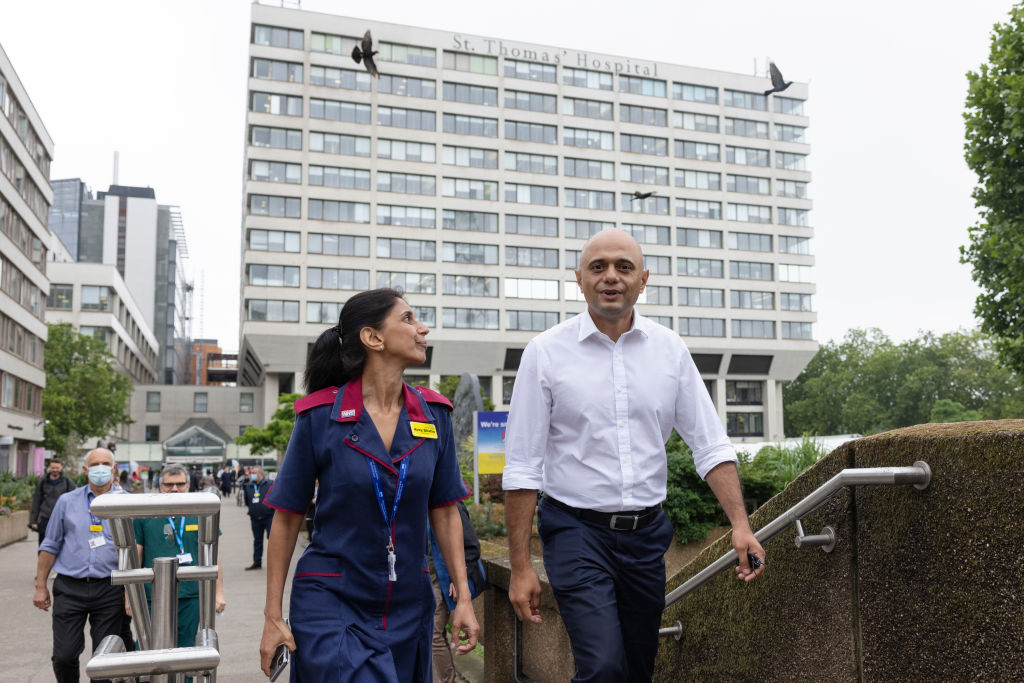Charging for GP visits defies all the rules of healthcare economics

The former Health Secretary Sajid Javid has said we should have to pay to see the GP as the crisis in the NHS worsens everyday, but doctor Jatinder Hayres argues this defies every principle of healthcare economics.
Just like former health secretary Sajid Javid, one of my earlier memories was sitting in the GP practice waiting area: that all too familiar clinical smell lingering around your nostrils, before being called in to see the doctor and help translate medical jargon into Punjabi for my mum. But the parallels end here – as I resolutely believe in the founding principle of the NHS: “rich and poor are treated alike, poverty is not a disability and wealth is not an advantage”.
As a frontline doctor, I know we can’t pretend the NHS is not in crisis. We’re at breaking point with patients stacked up in corridors desperately seeking a bed, a waitlist of 7 million, and A&E waiting times measured in days rather than hours. The health system is seemingly held together, almost with miraculous strength, by the good will of its depleting, burnt out, and undervalued workforce.
To ease waiting times, Javid has suggested charging people for their visits to the GP or to A&E. But imposing fees will only exacerbate health inequalities. The UK continues to be in the lamentable position as the most unequal country in the G7, behind only the US, according to the OECD. And inequality in the realm of health is disastrous.
Take, for example, Possilpark in Glasgow, where the life expectancy is 66 for a man; the more affluent area of Cathcart has a male life expectancy of 82 – despite being a 15-minute drive from each other. Worse still, despite a shorter life expectancy, the least affluent areas can expect to live a whole 19 years in worse health than those in the most affluent: this is what we call the health gap.
Javid pointed to Ireland as an ideal example of a “nominal” fee payment healthcare model. But the introduction of fees in Ireland resulted in people from low-income backgrounds – who are already likely to be sicker and die sooner than more affluent counterparts – to be five times more likely to forego a GP appointment.
The NHS model of general practice epitomises ruthless efficiency, a £20 fee won’t make a dent in the cash-strapped healthcare system and it would punish the most financially efficient limb
The introduction of either a blanket or means tested fee would be a disaster. Healthcare requirements exist on a socio-economic scale. The eminent doctor Julian Tudor Hart, described this as the “Inverse Care Law”. He wrote “To the extent that health care becomes a commodity it becomes distributed just like champagne. That is rich people get lots of it. Poor people don’t get any of it”.
On top of all of this, the economics of this policy are short-termist. Firstly, inequality itself is expensive – costing the taxpayer £4.8bn per year. Besides, the humble GP surgery is a pillar within many communities, yet the NHS model of general practice epitomises ruthless efficiency. Despite seeing the overwhelming majority of patients – we’re talking about 300 million consultations versus 23 million in A&E per year – general practice only receives around 9 per cent of the total NHS budget. The grand total cost incurred of a patient seeing their GP is £39.23, versus £419 for a single trip to A&E: an eye-water difference when magnified. A £20 fee will not make a dent in a cash strapped healthcare system, which has suffered from a funding gap of £400bn over the last decade. And punishing the most financially efficient limb of it is a grossly contradictory act.
Introducing barriers will lead to an inevitable shift towards late presentations of illnesses to A&E. Again, it wouldn’t only be morally wrong, but also catastrophically more expensive. Financial barriers are pervasive in seeking the medical service’s help: even something seemingly innocuous such as the inconvenience of parking charges at cancer screening sites can dissuade people from attending vital appointments. The sensitivity of socio-economic barriers is a real cause for concern; and the economic, as well as human cost, of delayed diagnoses are vast.
Sajid Javid’s proposal of an NHS fee-based system is a half-baked lurch towards a two-tiered system. The 1948 dream of a healthy, fully-functioning NHS that Sajid Javid spoke of has been an on-going Tory nightmare since its inception. Only one thing has insulated the NHS from a destructive market ideology: the public, and we must fight to preserve what is rightfully ours.
